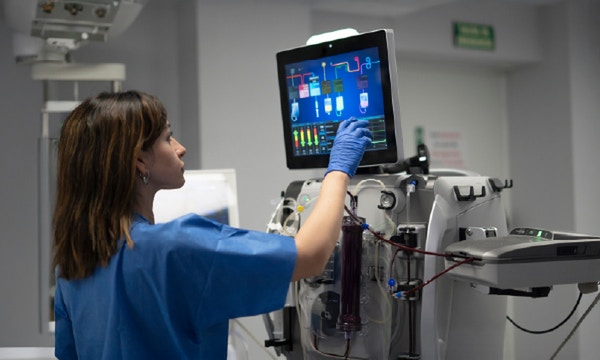Generative AI is a branch of artificial intelligence that generates original outputs, like content and code, in near real-time. Unlike other AI systems that focus on predictive tasks and identifying patterns, generative AI—trained on large datasets—produces creative outcomes. This creative spark is the reason it’s the most talked about tech trend in the world right now, with the potential to disrupt entire industries and the very nature of work.
Defining where the technology trend sits within the AI ecosystem, Kalyan Kumar, Global Chief Technology Officer and Head - Ecosystems at HCLTech, says: “Generative AI is a subset of artificial intelligence at the intersection of deep learning and natural language processing.”
A human-algorithm symphony
Generative AI centers around a deep collaboration between humans and algorithms.
“The technology is learning while it builds hypotheses and generates code and content. It can transform many areas including storytelling, summarization, code generation, code assistance and even computer graphics. Traditionally, these areas took people a lot of time. But that’s not the case anymore,” says Kumar.
However, he explains: “Despite these new levels of unprecedented speed, a human brain is still required to bring in aspects of responsibility, trustworthiness and validation.”
The opportunity with generative AI is immense and it will impact consumers, students, citizens, the enterprise employee and all aspects of social life, but human involvement is crucial. Humans are required to prompt the machine with the right questions to get the right answers to help solve problems, generate the necessary code or write the correct content. Asking the right questions has become a very important skill, with the rise of prompt engineers entering the workforce.
The generative AI opportunity
Today, with programs like OpenAI’s ChatGPT and Google’s Bard, generative AI is already impacting the consumer world. People are using it every day for every manner of things, including homework, writing and image generation.
In the enterprise there is significant potential to harness decades’ worth of data in the form of articles, videos and summaries to generate never-before-seen insights, while in end-user organizations, ranging from healthcare to travel, the transformative power of generative AI is monumental.
In healthcare, for example, it can assist in medical image analysis, convert X-rays and CT scans into clearer images to help with early diagnosis of diseases and discover new drugs, by creating new molecules and predicting molecule properties.
At HCLTech, generative AI is also opening the door for new opportunities and considerations.
“We’re applying generative AI within our own businesses, looking to understand how we can apply it to application development and maintenance, IT and OT operations and support, systems engineering and in business process operations,” says Kumar.
He points to four key areas:
1. Prompt engineering
As mentioned, generative AI requires the right prompts. Prompt engineering is a critical component of language model fine-tuning that involves designing and refining prompts to achieve specific outputs or behaviors.
The process of prompt engineering involves testing and refining prompts to optimize them for specific tasks, using techniques such as prompt tuning, blending and synthesis.
With prompt engineers, HCLTech can enrich domain specific knowledge, while exploiting the language model’s strengths and weaknesses to obtain better outputs, whether content or code, with minimal user effort.
2. Data engineering
Beyond analytics, data engineers need to create the right data pipeline for data ingestion, data management and data operations. Generative AI can support this and resolve the industry data scarcity crisis through the creation of synthetic data, which can help eliminate biases and lead to automatic error detection and the correction of data.
3. Integration and orchestration of intelligent apps
Generative AI can be integrated across enterprise, search and knowledge systems to create intelligent apps that drive new business models and value propositions. Importantly, when integrating generative AI systems, organizations should look to infuse or embed the capabilities of existing applications and their data rather than replace them.
4. Responsible AI
With the rise of generative AI, there is an opportunity for organizations to build responsible practices. This is crucial, perhaps above all else, to ensure a transparent and equitable future.
Industry-focused responsible AI must move beyond a list of principles, with organizations prioritizing the development of a stringent framework.
“These systems are not programmed, they learn based on how they’re taught. It's very important that you teach it with the right inputs, the right data and the right prompting,” says Kumar.
HCLTech outlines its approach to responsible AI in the following ways:
- Model explainability – a templatized framework to bring model explainability in at each stage of the AI process
- Trust in results – defines the features needed to validate results at the design stage, with multi-level checks to support trustworthiness of AI output
- Reliability – places emphasis on reliable performance of the AI system once in production, with custom AI app testing and quality framework for delivering reliable products
- Privacy and Security – the data privacy and security of people factored in at the data discovery, feature selection, model development and training stages
- Inclusion – design and test templates that ensure diversity and user backgrounds are well understood before AI systems are built
- Fairness – design, train and test templates to reduce potential bias and unfairness in the end product
- Traceability – establish not only how a system works, but how it was created and for what purpose, in a way that explains why a system has particular dynamics or behaviors
- Accountability – structures and processes are codified and implemented to ensure that all AI operations are driven by the principles in which they were built and agreed with all stakeholders
- Change Management – incorporating AI and change management process to support adoption, success and cultural shift
Cloud: The catalyst for innovation
The role of cloud
To truly take advantage of these generative AI opportunities and maximize its potential, the technology can only be deployed with the right data and cloud strategy. This was confirmed by 85 percent of senior decision-makers in recent research by HCLTech, Cloud Evolution: Make innovation a habit.
Generative AI and all next-generation technologies, such as the mixed reality powering the metaverse, quantum computing and 5G, will be powered in the cloud. “Due to the sheer volume of data processing, significant storage requirements and the handling complexity of these algorithms, there is no other place for them. Generative AI will be a cloud-delivered service and your cloud strategy will have to evolve to meet these new requirements,” says Kumar.
He adds: “Organizations that just move machines and infrastructure to the cloud aren’t getting the real value. Today, the journey to cloud is about modernizing and rearchitecting existing workloads, while extracting new capabilities. The innovation possible in the cloud enables the creation of new applications, built on technologies like generative AI. This needs to be supported by AI and data engineering skills, which is an integral part of HCLTech’s CloudSMART. We enable the data capability with cloud, which supports generative AI or machine learning models to extract significant business value.”
Every forward-looking business is exploring how they can deploy generative AI solutions to drive innovation, future-proof business models and gain competitive advantage. While still in the early stages of mass adoption, it’s clear that those companies that will succeed need the right cloud strategy, the right skills and the right partner with the experience to infuse next-generation technologies into existing business operations.
To discover more insights from HCLTech’s cloud research, Cloud Evolution: Make innovation a habit, click here

 Listen to article
Listen to article



